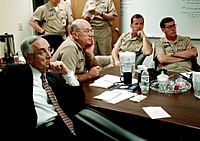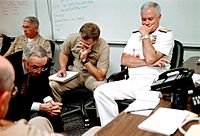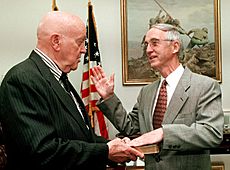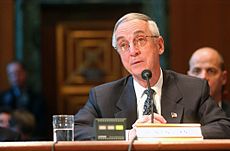Gordon R. England facts for kids
Quick facts for kids
Gordon England
|
|
|---|---|
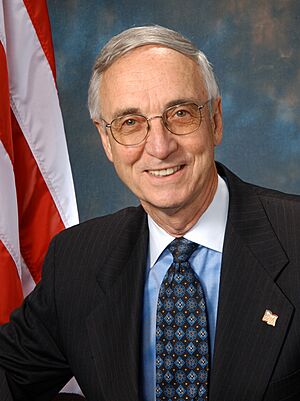
Official portrait, 2003
|
|
| 29th United States Deputy Secretary of Defense | |
| In office January 4, 2006 – February 11, 2009 Acting: May 13, 2005 – January 3, 2006 |
|
| President | George W. Bush Barack Obama |
| Secretary | Donald Rumsfeld Robert Gates |
| Preceded by | Paul Wolfowitz |
| Succeeded by | William J. Lynn III |
| 72nd and 73rd United States Secretary of the Navy | |
| In office October 1, 2003 – January 3, 2006 |
|
| President | George W. Bush |
| Preceded by | Himself |
| Succeeded by | Donald C. Winter |
| In office May 24, 2001 – January 24, 2003 |
|
| President | George W. Bush |
| Preceded by | Richard Danzig |
| Succeeded by | Himself |
| 1st United States Deputy Secretary of Homeland Security | |
| In office January 24, 2003 – October 1, 2003 |
|
| President | George W. Bush |
| Preceded by | Position established |
| Succeeded by | James Loy |
| Personal details | |
| Born |
Gordon Richard England
September 15, 1937 Baltimore, Maryland, U.S. |
| Political party | Republican |
| Spouse | Dotty England |
| Education | University of Maryland, College Park (BS) Texas Christian University (MBA) |
Gordon Richard England (born September 15, 1937) is an American businessman and politician. He served in several high-level government jobs for President George W. Bush. These roles included being the United States Deputy Secretary of Defense and serving twice as the United States Secretary of the Navy. The Secretary of the Navy is the top civilian leader of the U.S. Navy and Marine Corps.
Contents
Early Life and Education
Gordon England was born in Baltimore, Maryland. He went to Mount Saint Joseph High School and graduated in 1955.
After high school, England studied electrical engineering at the University of Maryland, College Park. He earned his bachelor's degree in 1961. Later, he got a Master of Business Administration (MBA) degree from Texas Christian University in 1975. In college, he was a member of honor societies for business, leadership, and electrical engineering.
Career in Business and Government
England had a long career in business before he started working for the government. He used his engineering and business skills to lead major companies that worked with the U.S. military.
From Engineer to Executive
England's career began in 1966 at a company called Honeywell. There, he worked as an engineer on Project Gemini, one of NASA's early space programs to send astronauts into space.
He later worked for other large defense companies like Litton Industries and General Dynamics. At General Dynamics, he held many important jobs. He was a vice president and later became the president of different parts of the company. He eventually became the Executive Vice President of General Dynamics, where he was in charge of information systems and international business.
Move to Government Service
In 2001, President George W. Bush asked England to join his administration. England left his business career to take on important roles in the U.S. government.
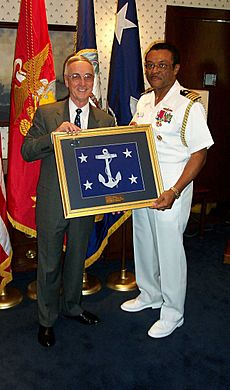
England became the 72nd Secretary of the Navy on May 24, 2001. Some people were concerned because he had worked for companies that sell weapons and equipment to the military. They worried it could be a conflict of interest. However, Secretary of Defense Donald Rumsfeld wanted leaders with business experience.
As Secretary, England worked to modernize the Navy. He aimed to develop new, advanced weapons for future challenges. He and Admiral Vernon Clark made big changes, including:
- Retiring dozens of older ships.
- Reducing the number of jobs.
- Combining Navy and Marine Corps aviation forces to be more efficient.
- Changing how ship crews were deployed to keep ships at sea longer.
After the September 11, 2001 attacks, England ordered all Navy ships to fly the first navy jack, a special historical flag. This was to honor those who died in the attacks and was to be flown for the entire War on Terrorism.
Deputy Secretary of Homeland Security
In January 2003, England became the first-ever Deputy Secretary for the United States Department of Homeland Security. This new department was created to protect the United States from threats like terrorism. He was in this role for only a few months, but it gave him more experience working with the White House.
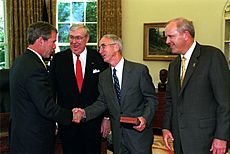
England returned to his old job as Secretary of the Navy on October 1, 2003. The person chosen to replace him, Colin R. McMillan, had died, so England was asked to serve again. He is one of the only people to have held the job twice.
In his second term, he focused on creating stronger ties between the Navy and the U.S. Coast Guard. He also worked to give more help to the Marines serving in Iraq.
In 2004, England was put in charge of a review panel for prisoners held at Guantánamo Bay, Cuba. The panel's job was to decide if the prisoners were still a threat to the United States. The reviews were held in secret with military officers. As a result of the review, 38 prisoners were released.
Deputy Secretary of Defense
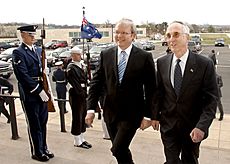
On May 13, 2005, England was promoted to Deputy Secretary of Defense. This is the second-highest civilian position in the Pentagon. He replaced Paul Wolfowitz. Many people saw England as a practical manager who was good at running the large department.
He served in this role until 2009, working for both President Bush and briefly for President Barack Obama.
Acting Secretary of Defense
For a short time in January 2009, England served as the acting Secretary of Defense. He was in charge of the Pentagon while Secretary of Defense Robert Gates had surgery.
Other Work and Awards
Throughout his life, England has been active in many community and charity groups. He was a city councilman and worked with Goodwill Industries. He also served on the boards of the USO and the Boy Scouts of America.
He has received many awards for his service, including:
- The Distinguished Alumnus Award from the University of Maryland.
- The Department of Defense Distinguished Public Service Award.
- The Silver Beaver Award from the Boy Scouts of America.
In 2012, he was elected as a member of the National Academy of Engineering for his work in developing advanced digital systems for aircraft and ships.
Images for kids
-
England (second from left) at a press conference in June 2001 with Paul Wolfowitz, James G. Roche, and Thomas E. White.
 | Jewel Prestage |
 | Ella Baker |
 | Fannie Lou Hamer |


